From skin patches to gastric band ‘jabs’ and even ‘smart’ loo paper: The new age of the flab-busters!
- Figures suggest 12 million of us are obese and another 20 million are overweight
- This can cause heart disease, diabetes and stroke, plus certain types of cancer
- Excess weight also puts a strain on the heart, which needs to work much harder
- Here, we look at the most promising future treatments for effective weight loss
The most recent figures show that around 12 million of us are obese and another 20 million overweight.
And as our body weight increases, so does our risk of metabolic syndrome — a group of risk factors linked to heart disease, diabetes and stroke, including raised blood pressure, blood fats and blood sugar — and the danger of certain cancers.
‘Being obese could knock ten to 20 years off your life expectancy,’ says Shaw Somers, a weight loss surgeon at Portsmouth Hospitals NHS Trust and Streamline Surgical clinics.

Ditch the diet book? Scientists believe we’re on the cusp of new, major weight-loss aids
‘Metabolic syndrome in particular is the plague of our time and can happen even at relatively low levels of weight gain,’ adds Mr Shaw, who is also president of the British Obesity & Metabolic Surgery Society.
These health problems occur because fat cells pump out hormones and chemicals that interfere with our blood sugar levels and other processes, increasing the risk of metabolic problems such as type 2 diabetes.
Excess weight also puts a strain on joints and the heart, which needs to pump harder to supply all the extra fat with oxygen.
-

Father takes 10,000 snaps to remember his life: 40-year-old…
Boys who grow up in privileged households produce more…
Obesity fuels anxiety and depression by disrupting gut…
Rock star’s wife says fighting cancer has made her feel…
Share this article
Recent research from Newcastle and Glasgow universities showed that patients with type 2 diabetes who followed an 800 calorie-a-day liquid diet for two months could lose more than 22lb (10kg) and send their disease into remission.
But while there seems to be a new diet plan or revolutionary weight loss breakthrough every week — adding up to a multi-billion-pound diet industry — anyone who has tried (and failed) to shed the pounds will know how hard it is to lose weight and keep it off. Now the latest scientific research may provide long-lasting weight loss.
From hormone jabs to manipulating your body clock, we take a look at the most promising future treatments.
TINY BEADS TO STOP HUNGER PANGS
The only intervention that has so far been proven to lead to significant long-term weight loss for obese people is surgery. Usually done as a keyhole procedure, one of the most common techniques is gastric banding where a silicone band is used to reduce the size of the stomach. Around 5,000 people undergo weight-loss surgery on the NHS every year.
‘Surgery leads to an average loss of 20 to 25 per cent of body weight after five years,’ says Mr Somers.
A newer innovation is a gastric balloon in the form of a ‘pill’ you swallow. Once in position, the balloon, called Elipse, is inflated with salt water via a tube. It dissolves after four months.

Would you take it? A newer innovation is a gastric balloon in the form of a ‘pill’ you swallow
A pilot trial of 135 overweight people with the balloon showed an average weight loss of nearly 29lb (13kg), it was reported earlier this year, and a larger 400-patient trial is underway across the U.S.
Elipse is available only privately in the UK, costs £3,200, and ‘because it only stays in for a few months the effects are likely to be temporary’, adds Mr Somers.
Another new approach, known as bariatric embolisation, involves injecting tiny beads to block the major blood vessels supplying the part of the stomach that produces the ‘hunger hormone’ ghrelin.
The approach is being tested in a small study of 20 obese patients at Johns Hopkins Hospital in Baltimore, USA, and if successful, UK-based trials are likely to follow within five years.
Preliminary results suggest it leads to a reduction in appetite and around 10 per cent weight loss after three months.
But Mr Somers warns: ‘Embolisation is like taking a couple of instruments out of the orchestra, whereas surgery completely changes the tune.’
AVAILABLE: Gastric balloon pill, now
Tiny beads, soon (at trial stage)
JAB WORKS LIKE A GASTRIC BAND
An exciting idea being researched is how to get the benefits of weight loss surgery without patients going under the knife.
At Imperial College London, for example, they are trying to replicate the effect with drugs.
‘Studies show that certain appetite-suppressing hormones made by the gut are raised after eating in people who have had surgery,’ says Dr Tricia Tan, a consultant in diabetes, endocrinology and metabolic medicine, who is leading the research. ‘We are working on ways of delivering these hormones directly into patients to see if it controls their weight.’

Non-surgical: An exciting idea being researched is how to get the benefits of weight loss surgery without patients going under the knife
The three main hormones are known as PYY, GLP-1 and oxyntomodulin, all of which are released once the stomach is full and have a potent appetite-suppressing effect.
Because people who have had gastric surgery have much smaller stomachs than people who haven’t, they produce the hormones more quickly after eating.
Dr Tan is carrying out clinical trials of a mixture of these three hormones which are continuously pumped into the body so people feel less hungry all day long.
The hormone cocktail, which is made in a lab, is introduced into patients with a device roughly the size of a mobile phone that has a tiny needle attached which goes under the skin (similar to insulin pumps used by many diabetics).
So far the results of a trial with 20 patients have been startling, and the findings are due to be published in a scientific journal.
‘Obese people with diabetes wore the pumps for 28 days, and all lost between 2.5kg to 8kg and reported eating 30 to 40 per cent less food overall,’ says Dr Tan.
‘We hope we will one day understand the regulation of hunger and the drive to eat, but we are a long way off these treatments helping the population on a day-to-day basis,’ adds Mr Somers.
AVAILABLE: Soon (at trial stage)
LOO ROLL TO TEST YOUR GUT BUGS
As well as nourishing the body, the food you eat feeds the billions of bacteria living in your gut, known collectively as microbiome.
Different species of bacteria have their own preferred food sources — such as fibre or fats — which are broken down to release chemicals called metabolites. So encouraging the growth of certain bacteria with particular foods will lead to an increase in the specific metabolites they produce.
According to new research from King’s College London, these bacterial chemicals have a powerful influence on weight.
Researchers studied different metabolites found in stool samples from more than 700 people and discovered the levels of eight in particular were strongly associated with having a higher BMI, while more than 100 were linked to higher body fat, reported the journal Nature Genetics earlier this year.

Insight: As well as nourishing the body, the food you eat feeds the billions of bacteria living in your gut, known collectively as microbiome
‘This work offers a promising insight into what causes obesity and how we might change this to our benefit,’ says Mr Somers.
The King’s College London researchers say their work could lead to the invention of ‘smart’ toilet paper that monitors levels of key metabolites in stools.
By providing an early warning of changes that might affect weight — such as an increase in the levels of ‘fattening’ metabolites — people could take steps to manipulate their microbiome to produce slimming chemicals instead.
‘You can’t take the metabolites as supplements, because they need to be made inside the gut,’ says lead researcher Dr Cristina Menni. ‘Rather than trying to replace specific species of bacteria, we could work out what chemicals are missing and give people foods or dietary supplements that encourage their production.’
AVAILABLE: 5 YEARS
PILL THAT TRICKS YOUR BODY-CLOCK
‘Breakfast like a king, lunch like a prince and dine like a pauper’ may seem old-fashioned advice, but the latest research suggests that the time of day we eat may be even more important than the food itself.
‘In studies in mice we found that feeding them a high-fat diet at night when they are naturally active did not result in weight gain,’ says Professor Carla Green, a neuroscientist at University of Texas Southwestern in the U.S., who is researching the link between the body clock — also known as circadian rhythm — and obesity.
‘But if they eat the same diet during the day when they should be asleep, then they gain tons of weight.’

Fat fact: People who sleep poorly or work night shifts often find that they put on weight
Professor Green believes the effect happens because of a mismatch between food intake and the body clock, which could also explain why people who sleep poorly or work night shifts often find that they put on weight.
‘The idea of “calories in versus calories out” for weight loss is too simplistic,’ she says. ‘Food is burned more efficiently when the tissue is active, so calories arriving at the wrong time are more likely to be converted into fat.’
Professor Green believes these findings can be applied to aid weight loss in humans. ‘It wouldn’t hurt to confine your eating to the eight hours of the day when you are most active,’ she says.
Mr Somers agrees, adding, ‘understanding our interaction with the daily cycle reminds us that we are humans and not machines, and that the habits and customs we associate with food may not be what our bodies really need at a particular time’.
In another U.S. study, scientists have shown that nobiletin, a chemical found in citrus peel, boosts the activity of body clock-related genes in mice and prevented weight gain and helped control blood sugar levels.
The doses of nobiletin used in the animal study were very high – far higher than could be obtained from eating citrus peel — and the researchers at the University of Texas are now developing a more potent version of the chemical that could be taken as a pill.
AVAILABLE: 5-10 YEARS
MIND GAMES TO FOOL YOUR BRAIN
A team at the University of Bristol is investigating how people’s attitudes affect whether they stick to diets and lose weight. ‘The key is developing psychological techniques to ensure people lose enough weight and keep it off,’ says Jeff Brunstrom, a professor of experimental psychology who is leading the research.
For example, he has found many people are put off trying restricted diets or intermittent fasting — despite the proof they lead to weight loss — because there’s a misplaced assumption that we need three meals a day, and the fear they will run out of energy.
‘When you ask people why they need to eat, many say they need to “restore their energy levels”, and they cannot concentrate or feel fatigued without eating,’ says Professor Brunstrom. ‘But healthy people have enough energy stored in their bodies to last for at least 40 days, so skipping a meal is not a biological challenge.’

Incorrect thinking: There’s a misplaced assumption that we need three meals a day
Professor Brunstrom says these false beliefs about energy balance mean that some people are reluctant to eat less – but these attitudes could be changed with psychological techniques.
In fact, research has shown our feelings of hunger are only loosely connected to our available energy stores and more closely related to our attitudes towards food — people may feel full after a meal but find room for dessert because they enjoy the sweet taste.
When the Bristol team asked participants in a study to fast for a day to see if their fears of hunger were realised, they proved that these concerns were unfounded.
‘At the beginning of the study people were worried that they would have headaches, fatigue or weakness, but most of them said they found it easier than they thought,’ says Professor Brunstrom. He believes these short-term challenges can retrain the brain into thinking that we can go with less food or even skip meals, and manipulating these underlying beliefs could be the key to long-term weight loss.
Research also suggests that dieters should eat smaller meals but make sure they are presented nicely and packed with variety. This tricks the brain into feeling satisfied with less food, and over-rides the fear of deprivation.
‘Understanding the psychology of food habits is central to the long-term behaviour changes needed to control weight gain,’ says Mr Somers. ‘It is also key to successful outcomes with all weight loss treatments.’
AVAILABLE: NOW
SKIN PATCHES CURB APPETITE
Building on the idea of hormone jabs, Dr Xiaoyang Wu at the University of Chicago is developing skin grafts that release the appetite-suppressing hormone GLP-1 into the body.
It’s similar to the principle behind nicotine or HRT patches, but these would be responsive, living on part of the patient’s skin instead of as a disposable sticker.
‘We grow skin stem cells in the lab for more than a year, then we use a new gene editing tool called CRISPR to genetically modify them to make GLP-1 and grow them into patches to be grafted onto the body,’ explains Dr Wu.

Future diets: One scientist is developing skin grafts that release the appetite-suppressing hormone GLP-1 into the body
He and his team have tested the patches only on mice, but results in the journal Cell Stem Cell last year showed that the skin grafts released GLP-1 into the animals’ blood and reduced weight gain and prevented diabetes on mice kept on a high-fat diet.
Human trials are some years off, but the technique would essentially be the same, with scientists making personalised grafts by taking a small sample of skin stem cells from a person and growing them in the lab.
‘Growing cells from individual patients gets around the problem of rejection by the immune system,’ explains Dr Wu. ‘Skin grafts can be stable in humans for five to ten years and can become permanent, so this could be a good long-term solution for weight control.’
Mr Somers is more cautious, pointing out that until we fully understand how obesity is caused, it is difficult to see how the patch will be applicable to the majority.
AVAILABLE: 10 YEARS
Source: Read Full Article
